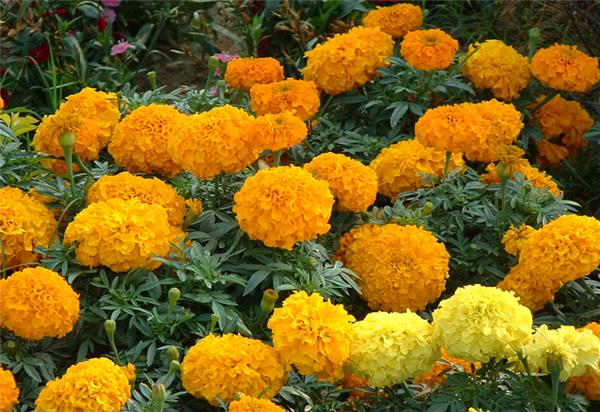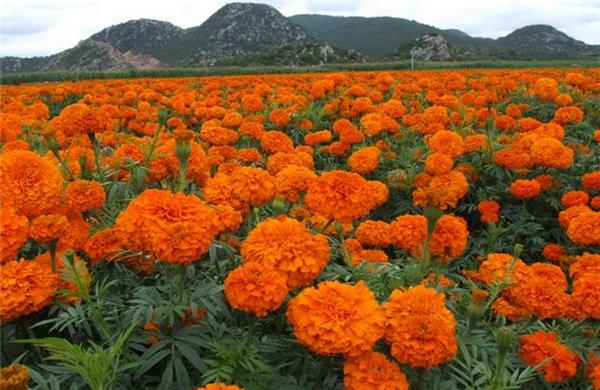Experience exchange of marigold planting technology
Marigold, alias stinky hibiscus, honeycomb chrysanthemum, smelly chrysanthemum. It is an annual herb of Compositae, marigold, native to Mexico. Its flowers and leaves have the effect of clearing heat and resolving phlegm, tonifying blood and dredging menstruation. In industry, they are mainly used as raw materials for extracting yellow pigment, and are widely used in food and beverage processing and other industries. At present, this natural pigment is mainly exported to South Korea and Japan, which is in short supply in the international market and has a considerable production prospect. This paper introduces the planting technology of marigold.

I. planting marigold
1. Make a bed. According to the climatic characteristics of long winter time, late spring warming and insufficient accumulated temperature in Luobei County, it is recommended to make a bed in autumn and complete the production of seedling bed and seedling shed before freezing to make it reach the state of sowing.
2. Disinfect the bed soil. Before buckling the film, use 4 grams of carbendazim per square meter of seedling bed or 100 times of water with 4 grams of 70% dimethazone, spray evenly on the bed surface and immediately buckle the plastic film seal for 3 days and then uncover the film for ventilation.
3. Seed treatment. Seeds with a germination rate of 95% and a purity of more than 98% use 25 Mu and 30 grams per mu. Before sowing, the seeds were soaked in 50% carbendazim 250 times solution for 10 ℃ for 15 minutes for disinfection, then soaked in 25 mol warm water for 8 hours, removed and dried, mixed with 10 mi 15 times fine sand for sowing.

II. Matters needing attention in planting marigold
Fertilization: the flowering period is long and fertilizer is needed to supply nutrients, but it is not suitable to apply more fertilizer, especially to control the application of nitrogen fertilizer, otherwise the plant is easy to grow, although the branches and leaves are luxuriant, but the flowering is delayed and poor.
Pruning: 1 or 2 coring should be carried out at the seedling stage to promote branching, control height and make the plant plump. If you want the flowers to bloom large, you need to remove the lateral buds to promote the full development of the terminal main buds. After coring, the height of the plant needs to be controlled by spraying relevant chemicals. Timely removal of residual flowers after flowering is conducive to future flowering.
Diseases and insect pests: standing blight, stem rot, leaf spot, root rot nematode and green bug, cinnabar leaf mite, cotton bridge worm, Spodoptera litura, whitefly, leafhopper and other diseases and pests.

Third, the function of marigold
1. Marigold can completely beautify your environment. Application of marigold dwarf varieties the dwarf varieties have strong branching, many flowers are dense, the plants are low, the growth is neat, and the spherical flowers are completely double. Can be put on the pot according to the needs, can also be transplanted in the flower bed, assembly graphics, etc. The application of medium-sized marigold varieties with large-color flowers, long florescence, extensive management, is one of the main varieties of lawn ornamental flowers.
2. Lutein from marigold has a special effect and can be used as a medicine to accompany the family. Marigold is rich in lutein. Lutein is a natural pigment widely found in vegetables, flowers, fruits and some algae. It can delay vision degradation and blindness caused by macular degeneration in the elderly, as well as cardiovascular sclerosis, coronary heart disease and tumor diseases caused by aging.

Although marigold has bright colors and large flowers, it will give off a peculiar smell. People who are sensitive to taste had better decide whether to breed marigold according to the situation. Friends who have a courtyard can put marigold in the yard to reduce the effect of its odor on the human body.
Related
- Wuhan Hospital Iron Tree Blooming Result Was Instantly Frightened by the Gardener Master
- Which variety of camellia is the most fragrant and best? Which one do you like best?
- What is the small blue coat, the breeding methods and matters needing attention of the succulent plant
- Dormancy time and maintenance management of succulent plants during dormancy
- Minas succulent how to raise, Minas succulent plant pictures
- What are the varieties of winter succulent plants
- How to raise succulent plants in twelve rolls? let's take a look at some experience of breeding twelve rolls.
- Attention should be paid to water control for succulent plants during dormant period (winter and summer)
- Watering experience of twelve rolls of succulent plants
- Techniques for fertilizing succulent plants. An article will let you know how to fertilize succulent plants.



